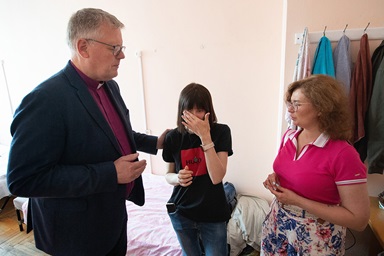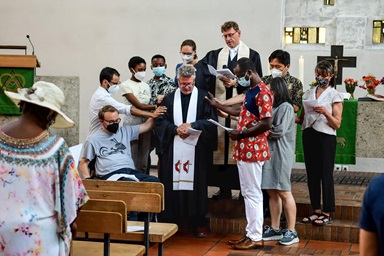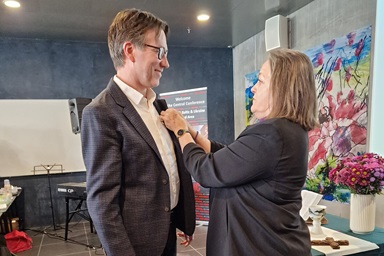The spring meeting of the United Methodist Board of Church and Society took place in a city that is now a melting pot of cultures and home to many migrants to consider issues such as global migration, justice and peace and poverty.
"What might 12 million United Methodists be able to accomplish if working together for justice and peace?" asked the Rev. Susan Henry-Crowe, the board’s top executive.
The meeting was the first time the agency has met outside the United States. The agency chose Berlin because the formerly divided German city stands in a special way for upheaval and reconciliation, Henry-Crowe said.
She opened the meeting with a reflection about the crossings and change that characterize life, saying this can be seen in geographical and political dimensions between East and West and South and North, as well as from poverty into possibility and from war into peace.
Anyone who listens to the stories that people tell about their crossing experiences can actively contribute to shaping the world towards more justice and peace, she said, adding that board members should use the time and the encounters with people in Berlin to consider that.
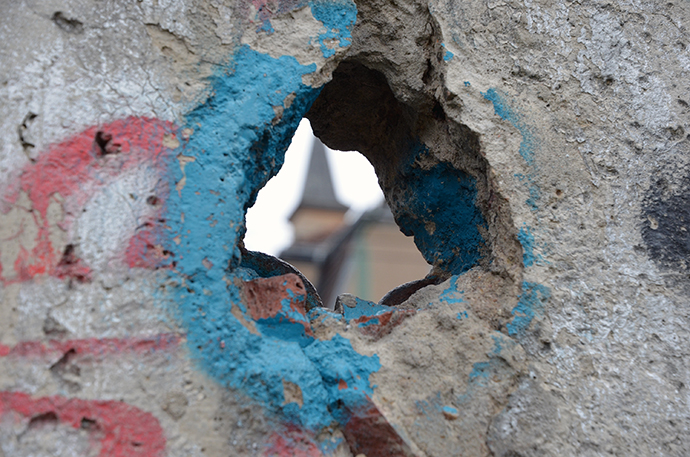
A hole in the Berlin Wall on the former east side at the Berlin Wall Memorial Bernauer Strasse shows the steeple of a building on the other side. The United Methodist Board of Church and Society chose Berlin for their conference March 15-18 partly because the formerly divided city stands for upheaval and reconciliation. Photo by the Rev. Klaus U. Ruof.
The meeting included a tour of the Berlin Wall led by retired German Bishop Rosemarie Wenner. The group went to the memorial on Bernauer Straße, marking the division of Germany and the city of Berlin. At the site of the former Church of Reconciliation, which was destroyed during the German Democratic Republic era, international guests were given an idea of how the church promoted reconciliation and peace.
The Reconciliation Chapel was built on the site of the former Church of Reconciliation, which stood in the so-called “death strip” between East and West Berlin and was blown up 1985 because it was "in the way" of Soviet wishes for complete control, the tour guide told the group.
"The church sometimes has to stand in the way to get the world moving," the tour guide said.
Four Syrian refugees also guided the group through the Neu-Koelln district of Berlin. The refugees described situations from their lives, their escape and their arrival and admission in Germany. Neu-Koelln was chosen for the tour because migrants from many different countries live there and information at shops and restaurants are in many languages.
For example, the board members experienced how strange they felt when the guides asked them to find a specific business on the basis of a note with Arabic characters.
"That's what happens to us refugees," one of the group leaders told the board members. "When we come to a country whose language and script we do not know, we feel lost in another world."
The guides also talked about the many challenges of leaving a home country, families and jobs behind and explained how the German government is helping resettle refugees and how much more needs to be done.
During the meeting, an update on the process for revising the Social Principles was presented to board members. The draft of the revised Social Principles will be available for public comment after Easter. After the comments are received, the board will take action in the spring of 2019 to approve a final draft for consideration at the 2020 General Conference.
The aim of the revision is to craft a more international version, since much of the current content is only relevant to U.S. conditions and laws, which limits internal denominational use of the Social Principles. The hope is to formulate condensed, basic social principles that can be further substantiated in the respective religious, political and cultural environment, Chicago Area Bishop Sally Dyck and board member Randall Miller explained.
The board also:
- Approved $20,000 in Human Relations Day grants in the Florida and East Congo Conferences.
- Approved $30,000 in Peace With Justice grants in the Oklahoma, North Georgia, Northern Illinois, Missouri, Congo, North Katanga, Zimbabwe, Tanganyika, and Central Congo conferences.
- Supported the March for Our Lives to end gun violence, and called upon young people, including church youth groups, to participate in marches near them on March 24, 2018.
- Passed a statement of support for the rights of migrants across the globe.
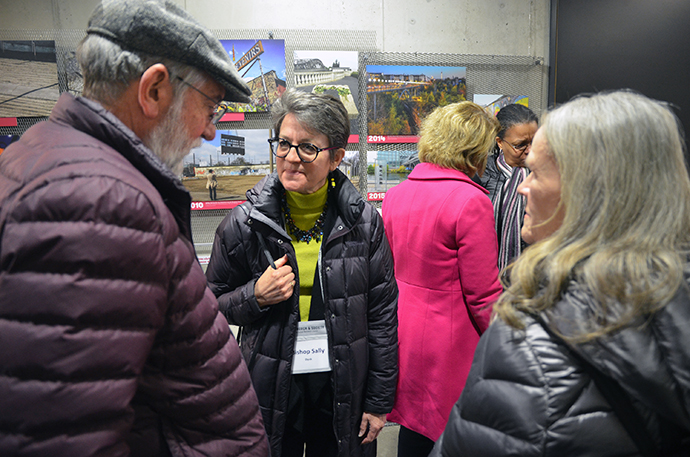
Chicago Area Bishop Sally Dyck speaks with others in the Visitor Center at the Berlin Wall Memorial Bernauer Strasse during the March 15-18 meeting of The United Methodist Board of Church and Society held in Berlin. Photo by the Rev. Klaus U. Ruof
On Sunday, the group split up and visited three very different United Methodist congregations in Berlin.
There was the traditional downtown congregation Christuskirche (Church of Christ) in the district of Kreuzberg, the dynamic Kreuzkirche (Church of the Cross) congregation in Berlin-Lankwitz in the south of Berlin and the Versoehnungskirche (Church of Reconciliation) in Berlin-Marzahn in the northeast of the city.
The latter is an ecumenical project with a Protestant parish in the same building.
At meetings following the services, the board members were able to get an idea of how Methodist congregations experience their ecclesial situation in a secular city. An American board member asked why all the shops were decorated for Easter and selling Easter things when “the ecclesiastical significance is no longer known?"
One of the German leaders explained that for many people, Easter is just "the rabbit festival."
An official from the Ministry of Foreign Affairs of the Federal Republic of Germany attended the meeting. Silke Lechner, the deputy head of the Responsibility of the Religions for Peace Task Force, spoke about the importance of churches and religions for promoting peace.
In the German Foreign Ministry, a special department was set up for this purpose. Worldwide, more than 80 percent of the population of the various countries are religious, Lechner said. She added that this means politicians cannot close their eyes to religion, especially in foreign policy.
The various religions should be perceived as partners in the development of peace-building measures and included in the political dialogue, Lechner said.
Ruof is director of communications for The United Methodist Church in Germany and Bruckbauer is director of communications for the United Methodist Board of Church and Society. Medial contact: Vicki Brown at 615-742-5470 or [email protected]. To read more United Methodist news, subscribe to the free Daily or Weekly Digests.
Like what you're reading? Support the ministry of UM News! Your support ensures the latest denominational news, dynamic stories and informative articles will continue to connect our global community. Make a tax-deductible donation at ResourceUMC.org/GiveUMCom.


